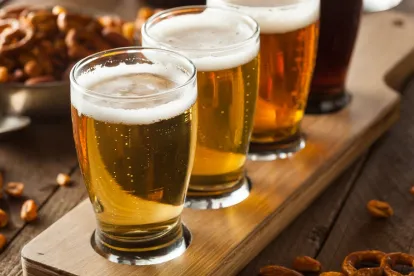Homebrewing and drinking craft beer are both widely popular. Currently, there are more than 6,000 craft breweries in the U.S., and over 2,000 homebrew clubs. As brewing for fun and profit has become more widespread, the applicable legal framework has also developed – and compliance is just as important for hobbyists as for professionals.
At the outset, it’s important to note that homebrewing and commercial brewing are subject to very different sets of laws. The most basic distinction is that homebrew can’t legally be sold, a golden rule (and actual rule) those of us in the homebrewing community can’t be reminded of enough. Therefore, homebrewers are unaffected by many of the regulations for-profit brewers must comply with – but are limited in what they can do with the final product (i.e. you can’t sell it).
Brewing at any scale requires a lot of water. On average, seven gallons of water are needed to make one gallon of beer – and most of that water ends up as waste. Commercial breweries must obtain Industrial User permits, allowing them to discharge wastewater to municipal treatment plants, if they discharge an average of 25,000 gallons per day or more of water. Each permit will describe and limit what compounds the discharged water may contain, and heavy fines may be levied if the permit’s terms are violated. In 2016, Pennsylvania brewery Yuengling learned firsthand what the cost of noncompliance can be – the brewery entered a consent decree with the United States to resolve a dispute over alleged discharge permit violations, agreeing to pay nearly $10 million in combined facility improvements and penalties – expenditures of the type we avoid by not selling homebrew. Yuengling’s discharges primarily contained sugar and yeast – not toxic or hazardous compounds – and exceeded permit limits for phosphorus and zinc, pH, and biological oxygen demand.
Fortunately for homebrewers, smaller production volumes obviate the need for discharge permits and much of the concern over wastewater disposal. In Pennsylvania, homebrew production is limited to 300 gallons annually per household – an amount far lower than would trigger discharge permit requirements. So long as you adhere to that limit, you should avoid regulatory scrutiny. Don’t forget – not selling your homebrew helps you avoid regulatory scrutiny as well. While penalties for brewing water disposal are generally not applicable to homebrewers, best practices in water management should be followed. Water used for cleaning brewing equipment or chilling wort can be dumped down the drain or used to water a yard or garden. However, brewing effluent, like other waste, shouldn’t be dumped into storm drains or bodies of water. Particularly in drought-prone areas, water conservation should be a focus. Water that’s piped through a counterflow chiller, for example, generally remains clean and can be used to wash equipment after brewing, or for other purposes. A batch of sanitizing solution – which is mostly water – can be used to clean multiple items before losing effectiveness, and most commercial sanitizers used by homebrewers are biodegradable and non-toxic.
The other main biproduct of brewing is spent grain – malted barley and other grains from which most of the fermentable sugar has been extracted. Despite its name, spent grain still contains nutrition, and lends itself to a variety of uses. Breweries commonly donate or sell spent grain to be used as animal feed, eliminating the need for costly disposal of the would-be waste. This practice is allowed by the FDA, so long as the brewers comply with human food safety regulations, ensure spent grains aren’t commingled with other waste or contaminants, and do not transform the grains after brewing by cooking or otherwise processing them. The agency considered more stringent handling and packaging rules for breweries offering spent grains as animal feed in late 2013, but withdrew the proposal following widespread industry pushback against what were expected to be costly and duplicative requirements.
Homebrewing isn’t subject to these regulations under which the FDA allows spent grains to be sold as animal feed. Therefore, just as you should never sell your homebrew, entrepreneurial homebrewers should not sell their brewing biproducts either – at least, not without researching all requirements governing the intended use of the grains or other waste. Homebrewers can, however, use their spent grains for personal consumption or composting. Because spent grain output from a home operation is much smaller than that of a commercial brewery, local waste management should easily dispose of whatever’s left over once you’ve had your fill of spent grain bread (or granola, or pizza dough, or pretzels, or dog treats…) and your compost bin and your neighbors’ are overflowing.
If you’ve read this far, you’ve probably gathered that you’re not allowed to sell your homebrew. And I can’t accept homebrew in exchange for legal services. I know, it’s a bummer. But look on the bright side: as homebrewers, we deal with far fewer regulatory restrictions on our brewing and waste disposal processes. And we can be innovative and experimental, free to break the law of the Reinheitsgebot.
Oh, one last thing: don’t sell your homebrew!
Kathleen Kline is a litigator and environmental lawyer who handles a variety of matters, including disputes over water pollution as well as professional liability. Kathleen also serves as Legal Advisor to the Philadelphia Homebrew Club, in which capacity she constantly reminds Club members that it’s against the law to sell homebrew.



 />i
/>i
